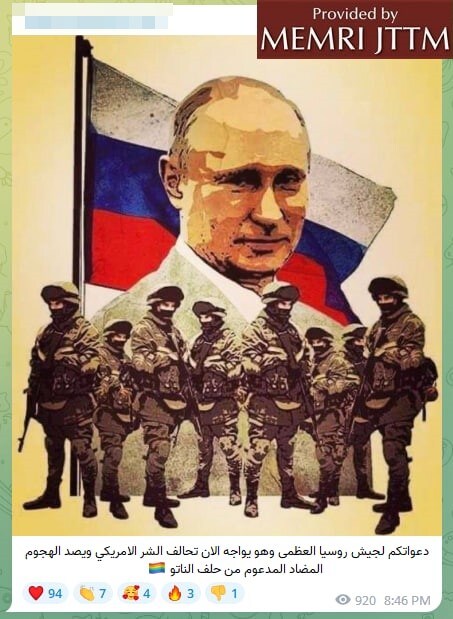The following report is a complimentary offering from the MEMRI Iran Threat Monitor Project (ITMP). For more information, write to memri@memri.org with "ITMP Subscription" in the subject line.
On June 7, 2023, an Iran-backed Iraqi Telegram channel which describes itself as the "best friends of Russia in Iraq" – called on its subscribers to pray for the Russian Armed Forces amid an ongoing Ukrainian counteroffensive against Russian forces in Eastern Ukraine.
On Telegram,[1] the channel posted an image depicting Russian soldiers standing before Russian President Putin and the Russian flag. Pro-Russia social media accounts have previously used the image in posts on Facebook, Twitter, and other social networks.[2]
Captioning the image, the channel wrote: "Your prayers for the army of great Russia as it now fights against the American coalition of evil and repels the counteroffensive supported by the NATO alliance." A LGBTQ+ pride flag emoji followed the phrase "NATO alliance" in the post; Iran-backed social media outlets regularly associate NATO with the flag in posts aimed at denigrating the Western alliance.

Similarly, Telegram channels affiliated with Iran-backed militias in Iraq also called for support for Russia. For example, on June 8, a Telegram channel which is affiliated with the militia Ashab Al-Kahf, published the same post verbatim as the pro-Russia Telegram channel.[3]

Iran-backed social media outlets have remained staunch supporters of Russia's invasion of Ukraine. Telegram channels such as "Sabereen News," which is affiliated with Iran-backed militias in Iraq, have variously championed President Putin, Russian generals, and the Wagner Group, while denigrating Ukrainian President Zelensky and NATO.[4] This pro-Russia information campaign by Iran-backed social media channels coincides with an uptick in engagement between Russian and Iranian proxy groups across the Middle East.[5]
[1] Telegram, June 7, 2023.
[2] Facebook, August 31, 2022.
[3] Telegram, June 8, 2023.
[4] See MEMRI JTTM report Putin's Friends In Iraq: Russia's Burgeoning Partnership With Sabereen News, The Mouthpiece Of The Iran-Backed Militias In Iraq (Part I), April 24, 2023.
[5] See MEMRI JTTM report Russia's Wartime Ties To Iran-Backed Designated Terrorist Groups Threatens Regional Security, U.S. Interests In Middle East, June 9, 2023.
The full text of this post is available to subscribers.
Please login or register to request subscription information from MEMRI





